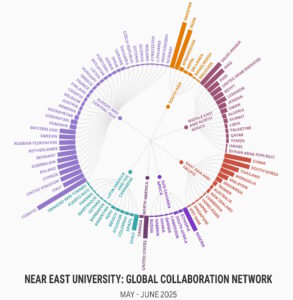The updated chart visualizes Near East University’s global research collaboration network for May–June 2025, based on Scopus-indexed publications. It highlights the university’s continued commitment to international academic cooperation across a wide range of countries and disciplines.
During this two-month period, Türkiye remained the university’s most significant research partner with 42 joint publications, followed by Pakistan (35 collaborations) and India (31 collaborations). These strong ties underscore Near East University’s strategic academic engagement with South Asia and its neighboring region.
Further substantial collaborations were recorded with Saudi Arabia (21), China (20), South Korea (20), Iraq (19), and Nigeria (19). European partners also played a key role, notably Italy, the United Kingdom, and the United States—each with 17 publications—along with Cyprus (16) and Poland (16).
Other notable partnerships included Azerbaijan (15), Germany (14), Thailand (13), and a diverse set of countries from Europe (e.g., Sweden, Switzerland, Netherlands, Russian Federation) and Latin America (e.g., Chile, Colombia, Ecuador, Mexico, Peru).
In total, Near East University collaborated with researchers from 97 countries during this period—an increase from the previous cycle. New or sustained partnerships emerged across Europe, Asia, Africa, the Middle East, Oceania, and the Americas, including with institutions in Japan, Ethiopia, Canada, Australia, Ghana, and Vietnam.
This global academic footprint demonstrates Near East University’s mission to promote high-impact, interdisciplinary research through international cooperation. By nurturing such diverse academic connections, the university strengthens its role in addressing global challenges through collective knowledge, innovation, and shared expertise
